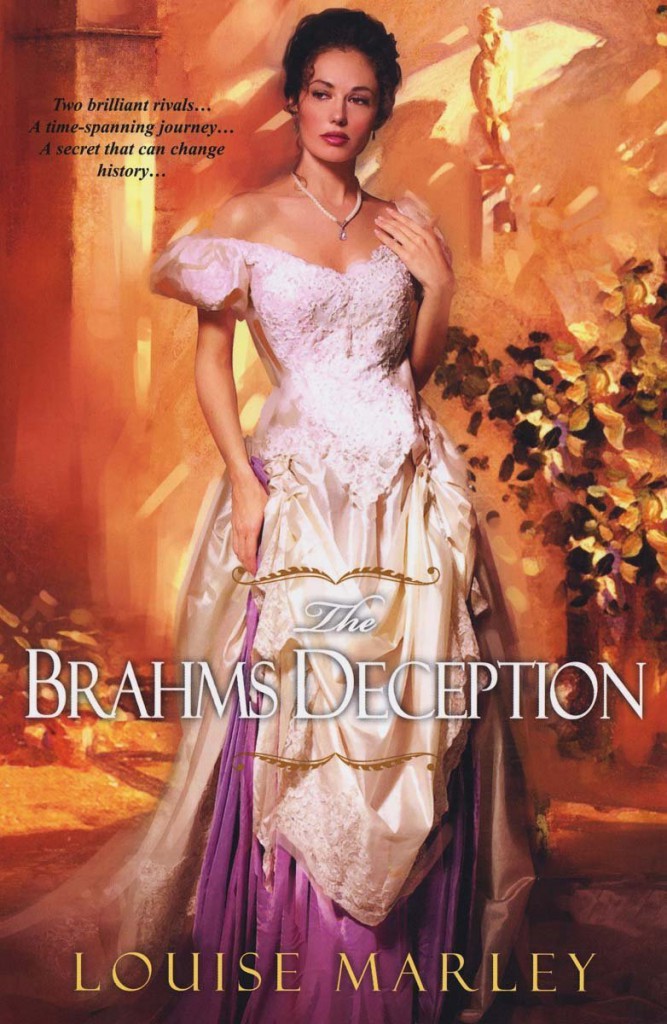Excerpt: The Brahms Deception
Prelude
Her reflection in the ebony wood of the Gewandhaus piano disturbed her. She wished she were using a score so the pages of music would block the image. Her eyes were too large. Her chin was small and pointed, and her mouth an unexceptionable rosebud, but her eyes were those of a fawn, enormous, oddly shaped, gleaming darkly under the flickering gas lights. She looked terrified, and she was.
The long skirts of her blue silk dress spilled over the piano stool. She had to kick the hem free of the pedals. The fitted sleeves puffed above the elbow, making her wrists look like white sticks. A great, childish bow, blue to match her dress, adorned the back of her hair. It embarrassed her, but she had no power over the choice of it.
She had no power at all, in fact, not in the matter of the bow or in any of the other details of this performance. Her father had chosen the dress, had supervised the dressing of her hair, had dictated what she would eat for dinner and when. He had chosen the music for her programme,
had selected the Gewandhaus for her debut, had collected the ticket money with his own hands.
If she looked up, past the shining lid of the piano, she would see his clear, hard eyes watching her from the proscenium.
She kept her eyes lowered. She must concentrate. Her father’s reputation as a teacher, and their future income, rested on her performance. He had reminded her of this many times. She had practiced until her fingers burned and her back ached. She knew the Variations perfectly, and would play them from memory. Some might call that vanity, but she preferred, even though she was nervous, to play without music.
She was ready. She just wished her father would go out into the house.
She curled her fingers over the keys, took a deep breath, and began.
The first notes disappointed her, seeming frail and somehow juvenile. The piano had sounded much stronger, much more full in her practice sessions. She was startled by the way the bodies of the audience absorbed the resonance.
She took another breath, concerned now only about the music and what she wanted it to say. She played the next phrases with more vigor, striking the keys with determined purpose. Goethe was to say, one day in the near future, that she played “with the strength of six boys”. That would mean nothing to her, but the music did. The music made everything else tolerable. The muscles of her arms and hands began to thrum with energy. She knew how she wanted the notes to sound, how she could make the piano sing. She played on with unconscious authority, an assurance beyond her years.
It began to happen. She forgot her reflection, forgot her fatigue, forgot even her father. Brilliant notes poured from the piano, cascading over the stage, drowning the faint hiss of the footlights as they poured into the hall. She played from her soul. She never hesitated, never faltered. She drove on to the end of the Variations without once looking up from the keyboard.
She reached the cadence, and held it, letting the resonance of the chord die away on its own. She closed her eyes, relishing the moment of a piece well played, of music created, of the expression of an inner meaning no words could describe.
When she opened her eyes, she saw her father gazing fixedly at her from the wings. He was smiling, but it was that tight, pointed smile that meant there was something he wanted. She stiffened. What was it?
As the music left her, she became aware of another sound, a bigger, rougher sound. She turned her head, seeking the source, and realized there was a roar coming from the house.
It was for her. It was a rush of noise, gloved hands beating together, voices calling out. Brava, brava! She had forgotten for a moment where she was, how much this performance meant. She froze. What she was supposed to do now?
Curtsy. That was it. Bow. This was her debut, and this applause was for her.
Awkwardly, she swiveled on the stool. Her long dress caught on the pedals of the piano, and she had bend to untangle it with her hands before she could stand. She picked up her skirts and stepped away from the piano to the edge of the stage, careful of the heat of the footlights. She bobbed, twice, her cheeks as hot as the burning lamps at her feet.
Then, though the applause continued, she fled the stage. She turned away from her father. He would have to work his way around the back of the stage, dodge dusty stacks of equipment and piles of thick ropes to reach her. She flung herself into the tiny, dim dressing room, and collapsed into the chair before the tall pier glass.
Clara Wieck stared at her murky reflection, the big blue bow framing her small head, and marveled. She was nine years old. She had just become a professional.

